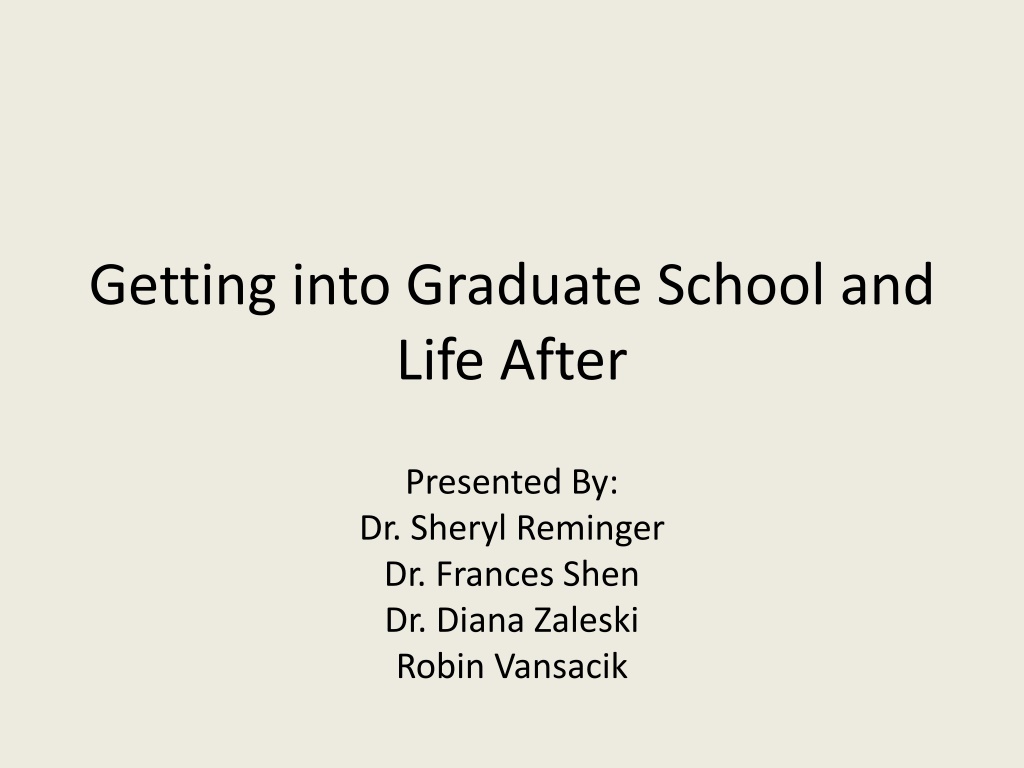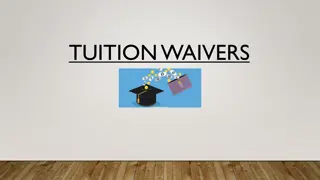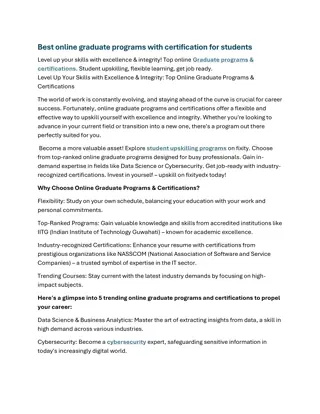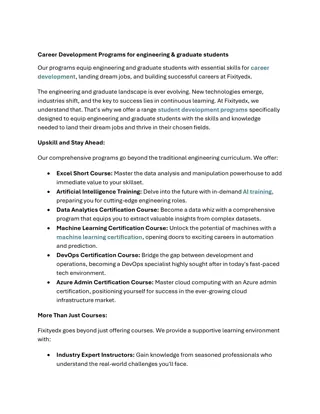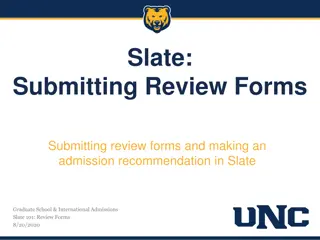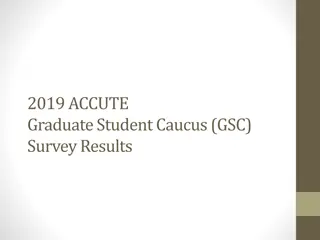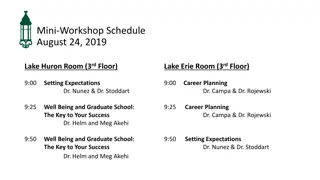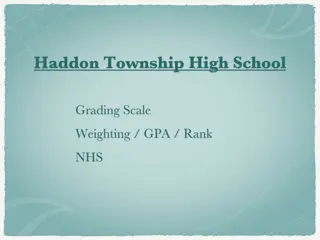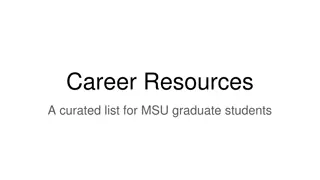Guide to Graduate School: Programs, Admissions, and Career Paths
Explore the nuances of Master's, Psy.D., and Ph.D. programs, crucial admission criteria, recommendation letters, GRE preparation, and researching schools. Delve into questions about career choices, motivations for further education, and the right timing for graduate school. Understand the differences between Master's and Doctoral degrees, and the unique features of Ph.D. versus Psy.D. programs. Gain insights into application components and vital considerations to navigate successfully through graduate school admission and beyond.
Download Presentation

Please find below an Image/Link to download the presentation.
The content on the website is provided AS IS for your information and personal use only. It may not be sold, licensed, or shared on other websites without obtaining consent from the author. Download presentation by click this link. If you encounter any issues during the download, it is possible that the publisher has removed the file from their server.
E N D
Presentation Transcript
Getting into Graduate School and Life After Presented By: Dr. Sheryl Reminger Dr. Frances Shen Dr. Diana Zaleski Robin Vansacik
Overview What is the difference between Master s, Psy.D., and Ph.D. programs? What criteria is important for admission? How to get good recommendation letters? What are personal statements? How to prep for the GREs? How to research schools?
Questions to Consider Do you have a clear idea of the career you want to pursue? What is your motivation for continuing your education? Is this the right time for graduate school or should you get more experience in the field? What are your options for continued learning? Have you looked at graduate certification programs?
Degree Comparison Master s Degree vs. Doctoral Degree Master s Degree (M.A., M.S., M.S.W.) Doctoral Degree (Ph.D., Psy.D., M.D.) Shorter time to complete (2-4 years) Longer time to complete (4-8 years) Less expensive More expensive Less stringent admission requirements More stringent admission requirements May be the best degree for certain careers (e.g., counselor, social worker) May be the best degree for certain careers (e.g., psychologist, professor) Potentially lower salaries Potentially higher salaries Potentially fewer career options Potentially more career options Ph.D. vs. Psy.D. Ph.D. Psy.D. More research-oriented More practice-oriented Commonly acquired at universities Commonly acquired at professional schools Less expensive More expensive More financial assistance Less financial assistance More stringent admission requirements Less stringent admission requirements Longer time to complete (6-8 years) Shorter time to complete (4-7 years)
Number of Applications and Acceptances 2013-2014 Academic Year APA Education Directorate (2016), N = 520 departments. 1,688 programs apa.org/education/grad/survey-data/2016-report.pdf
Application Components Curriculum vitae a resume for academics Letters of recommendation establish good relationships with three professors or relevant supervisors Personal statement obtain research, internship, volunteer, service and/or work experience to draw from GRE scores general and perhaps subject test Transcripts maintain good grades; take advanced classes Fees for applications, transcripts, GRE Interview may include travel (funded or not) Deadlines often winter/early spring; depends on program
Which criteria is most important? Dimension Letters of recommendation GPA Personal statement GRE scores Research experience Interview Work experience Clinically related service Extracurricular/Psi Chi Masters Rank Doctoral Rank
Which criteria is most important? (2) Dimension Letters of recommendation GPA Personal statement GRE scores Research experience Interview Work experience Clinically related service Extracurricular/Psi Chi Masters Rank 2 1 3 4 6 5 8 7 9 Norcross et al., 2005 & Landrum et al., 1994 Doctoral Rank 1 2 3 4 5 6 7 8 9
Letters of Recommendation How many do you need? Who should you ask? At least 2 faculty, typically in your major People who can speak to: Academic abilities and potential for graduate work Clinical and/or Research skills Any honors or awards you have received Your career interests and qualifications for that career Are of good quality Have an established, positive relationship with the writer
Letters of Recommendation (2) How should you ask? Preferably, in person Give plenty of notice (2 weeks +) Be clear about addresses, instructions, and deadlines Provide personal statement, GRE scores, and CV If asking professors in the Psychology Department, complete Letter of Recommendation Form at: http://www.uis.edu/psychology/students/forms/index.html
Personal Statement Purpose of Personal Statement? Get to know you beyond your stats Assessment of communication & writing skills Assessment of fit between their program and you! How to write a personal statement? Get their attention! Focus on specifics and examples, not generalizations Discuss: career goals, why graduate school, why this program Tailor each statement to the school/program Follow any instructions Get feedback and edit, edit, edit!
Graduate Record Examination (GRE) www.ets.org/gre/ GRE General Test and Subject Test (Psychology) The General Test takes about 3 hours and 45 minutes and consists of three sections: Verbal Reasoning, Quantitative Reasoning, Analytical Writing The GRE Psychology Test includes 205 multiple-choice questions. Who Should Take These Tests? Requirements vary by university and degree program. How Much Do They Cost? GRE General Test - $205 GRE Subject Test - $150 How Do I Take the Tests? Students register online and select a convenient test date and location. How Do I Prepare? There are free test preparation materials and resources available online and through the university career development center.
How Do I Research Schools? Which programs should I apply to? Consider your career options. Ensure programs are accredited (see handout). Consider both master s and doctoral programs. Consider which programs align best with your goals. Visit universities and talk to faculty in programs of interest. What are faculty research interests? Are scholarships or fellowships available? Are teaching or research assistantships available? How are mentoring and advising relationships established? Is graduate student housing available?
Resources at UIS to Help The UIS Career Development Center can help! uis.edu/career The Career Development Center can Help you create a graduate school application timeline with all of the schools you are interested in Help you research schools and programs Help with resumes/CVs, applications, and personal statements Offer mock interviews for job and school interviews Help you find valuable experience opportunities that may help you get into grad school
Additional Resources Graduate study in psychology (published by APA every year) Insider's guide to graduate programs in clinical and counseling psychology (Norcross & Sayette, 2016) The psychology major: Career options and strategies for success (Landrum & Davis, 2013) Applying to graduate school in psychology (Kracen & Wallace, 2008) Getting in: A step-by-step plan for gaining admission to graduate school in psychology (APA, 2007) The complete guide to graduate school admission: Psychology, counseling and related fields (Keith-Spiegel & Wiederman, 2000) How are admissions decisions made for clinical psychology graduate programs? (Pashak, Handal, & Ubinger, 2012)
